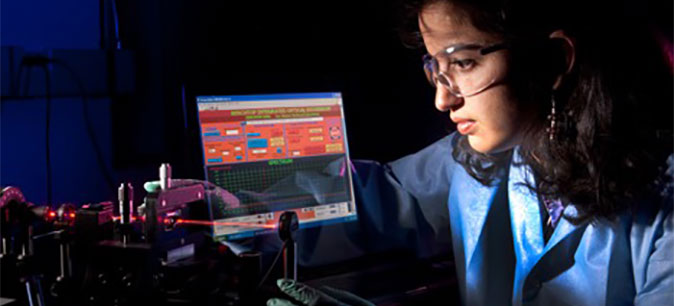UC keeps Los Alamos Laboratory on cutting edge of science and research

Scientists at Los Alamos National Laboratory conduct cutting-edge research in areas such as nuclear science, materials physics and advanced computing systems. (Photo courtesy: Los Alamos National Laboratory)
For three-quarters of a century, Los Alamos National Laboratory has been a singular force in advancing scientific knowledge across new frontiers — from its origins in World War II to its role in the Human Genome Project and the exploration of Mars.
Since Los Alamos’ earliest years, the University of California has played a key role in managing the laboratory. Now, as a member of a new consortium, Triad National Security LLC, which the U.S. Department of Energy has selected to manage and operate the laboratory, the university is proud to continue its stewardship.
“UC and Los Alamos have been at the forefront of solving some of the greatest scientific, technological and engineering challenges of our times,” said UC President Janet Napolitano. “The U.S. Department of Energy’s decision is a testament to UC’s historic commitment to scientific and technological excellence at Los Alamos.
“UC and our Triad partners have an unmatched combination of nuclear science, research and development, and management expertise that will protect and enhance the laboratory’s critical national security operations in the years ahead.”
Throughout UC’s long relationship with Los Alamos, the university’s academic expertise has facilitated some of the laboratory’s most significant scientific contributions in fields such as high performance computing, applied physics and nanotechnology.
In the 1950s, laboratory scientists developed nuclear-powered rockets for space exploration. In 1972, Los Alamos debuted the world’s most powerful particle accelerator, enabling cutting-edge experiments in nuclear medicine, materials science and biomedical research. A decade later, Los Alamos biophysicist Walter Goad and his colleagues created GenBank, a national genetic-sequence database that paved the way for the establishment of the Human Genome Project.
At every turn, Los Alamos scientists and researchers have pushed the boundaries of science in service of a safer, more secure future for our country.
“Over the history of its stewardship of Los Alamos, UC has fostered a culture of scientific innovation and integrity critical to safeguarding the laboratory’s core national security missions,” said UC Vice President for National Laboratories Kimberly Budil.
“The collective strengths of the university and our partners on the Triad team will catalyze continued innovation in science and technology and operational excellence to ensure the laboratory continues to be a premier research institution.”
The laboratory’s work now spans an ever more diverse array of fields, including nuclear nonproliferation, energy security and climate change. As a key member of the lab’s management team, UC will continue to support this work by overseeing the laboratory’s basic and applied research programs and bolstering its robust research and development activities.
“UC has always delivered world-class science and research that serves our national security at Los Alamos,” said the Honorable Ellen Tauscher, chair of the UC Board of Regents National Laboratories Subcommittee. “UC and the UC Board of Regents are proud to stand with our new partners to provide this crucial service to the nation.”


